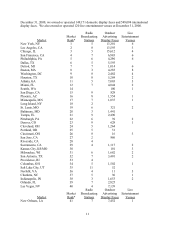iHeartMedia 2000 Annual Report Download - page 21
Download and view the complete annual report
Please find page 21 of the 2000 iHeartMedia annual report below. You can navigate through the pages in the report by either clicking on the pages listed below, or by using the keyword search tool below to find specific information within the annual report.
21
• possible revisions to the manner in which the FCC counts stations for purposes of the local radio
multiple ownership rule;
• the possible modification of the dual network rule to allow one of the four major national networks to
merge with one of the newer networks; and
• whether the prohibition on common ownership of a daily newspaper and a radio or TV broadcast
station in the same market should be “tailored” to cover “only those circumstances in which it is
necessary to protect the public interest.”
The FCC has commenced its separate proceedings related to the dual network rule and station
counting for purposes of the local radio multiple ownership rule. It has not yet commenced its proceeding
with respect to the newspaper/broadcast cross-ownership rule. In January 2001, the FCC completed its
2000 biennial review, making no additional relevant changes to its ownership rules.
We cannot predict the impact of future biennial reviews or any other agency or legislative
initiatives upon the FCC’ s broadcast rules. Further, the 1996 Act’ s relaxation of the FCC’ s ownership
rules has increased the level of competition in many markets in which our stations are located.
Under the FCC’ s ownership rules, a direct or indirect purchaser of certain types of our securities
could violate FCC regulations or policies if that purchaser owned or acquired an “attributable” interest in
other media properties in the same areas as our stations or in a manner otherwise prohibited by the FCC.
All officers and directors of a licensee and any direct or indirect parent, general partners, limited partners
and limited liability company members who are not properly “insulated” from management activities, and
stockholders who own five percent or more of the outstanding voting stock of a licensee or its parent,
either directly or indirectly, generally will be deemed to have an attributable interest in the licensee.
Certain institutional investors who exert no control or influence over a licensee may own up to twenty
percent of a licensee’ s or its parent’ s outstanding voting stock before attribution occurs. Under current
FCC regulations, debt instruments, non-voting stock, and properly insulated limited partnership and
limited liability company interests as to which the licensee certifies that the interest holders are not
“materially involved” in the management and operation of the subject media property generally are not
subject to attribution unless such interests implicate the FCC’ s “equity/debt plus,” or “EDP,” rule. Under
the EDP rule, an aggregate interest in excess of 33% of a licensee’ s total asset value (equity plus debt) is
attributable if the interest holder is either a major program supplier (providing over 15% of the licensee’ s
station’ s total weekly broadcast programming hours) or a same-market media owner (including
broadcasters, cable operators, and newspapers). To the best of our knowledge at present, none of our
officers, directors or five percent stockholders holds an interest in another television station, radio station,
cable television system or daily newspaper that is inconsistent with the FCC’ s ownership rules and
policies.
Alien Ownership Restrictions
The Communications Act restricts the ability of foreign entities or individuals to own or hold
certain interests in broadcast licenses. Foreign governments, representatives of foreign governments,
non-U.S. citizens, representatives of non-U.S. citizens, and corporations or partnerships organized under
the laws of a foreign nation are barred from holding broadcast licenses. Non-U.S. citizens, collectively,
may own or vote up to twenty percent of the capital stock of a corporate licensee. A broadcast license
may not be granted to or held by any corporation that is controlled, directly or indirectly, by any other
corporation more than one-fourth of whose capital stock is owned or voted by non-U.S. citizens or their
representatives, by foreign governments or their representatives, or by non-U.S. corporations, if the FCC
finds that the public interest will be served by the refusal or revocation of such license. The FCC has
interpreted this provision of the Communications Act to require an affirmative public interest finding
before a broadcast license may be granted to or held by any such corporation, and the FCC has made such
























